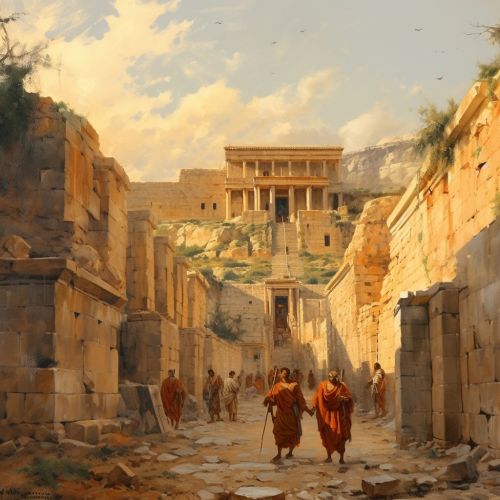Phaedo
Overview
"Phaedo" is a dialogue written by the ancient Greek philosopher Plato. It is one of the last dialogues featuring his mentor Socrates, who is the main character in the dialogue. The dialogue takes place on the day of Socrates' execution and explores themes of death, the immortality of the soul, and the theory of Forms.
Historical Context
"Phaedo" is set in 399 BC, in the city of Athens, shortly after the Peloponnesian War. The dialogue takes place in the prison where Socrates is held before his execution. The historical context of the dialogue is important, as it reflects the political and social climate of Athens at the time. The Athenian democracy had just been restored after the rule of the Thirty Tyrants, and Socrates was seen as a political threat due to his association with some of the tyrants.

Characters
The main characters in "Phaedo" are Socrates, Phaedo of Elis, and two Pythagorean philosophers, Simmias and Cebes. Other characters include Crito, a wealthy Athenian who was a student and friend of Socrates, and Echecrates, a Pythagorean philosopher who is the audience for Phaedo's retelling of the dialogue.
Themes
"Phaedo" explores several philosophical themes, including the nature of the soul, the concept of death, and the theory of Forms. The dialogue is known for its arguments for the immortality of the soul and the idea that true knowledge is recollection of the Forms.
Immortality of the Soul
One of the main themes of "Phaedo" is the immortality of the soul. Socrates argues that the soul is immortal and that it exists before and after death. He presents several arguments to support this claim, including the Argument from Opposites, the Theory of Recollection, and the Argument from Affinity.
Theory of Forms
Another major theme in "Phaedo" is the theory of Forms. According to this theory, the physical world is not the real world, but rather a world of appearances. The real world, according to Socrates, is the world of Forms, which are eternal, unchanging, and perfect.
Philosophical Arguments
"Phaedo" is known for its detailed philosophical arguments, particularly those concerning the immortality of the soul and the theory of Forms. These arguments are complex and require careful analysis to fully understand.
Argument from Opposites
The Argument from Opposites is one of Socrates' arguments for the immortality of the soul. According to this argument, everything comes from its opposite. For example, life comes from death, and vice versa. Therefore, the soul must exist after death, because death is the opposite of life.
Theory of Recollection
The Theory of Recollection is another argument for the immortality of the soul. According to this theory, learning is actually a process of recollection. The soul, Socrates argues, must have existed before birth in order to have knowledge to recollect.
Argument from Affinity
The Argument from Affinity is another argument for the immortality of the soul. According to this argument, the soul is like the Forms - invisible, unchanging, and divine - and therefore must be immortal.
Reception and Influence
"Phaedo" has had a significant impact on Western philosophy. The dialogue's arguments for the immortality of the soul and the theory of Forms have been widely discussed and debated by philosophers throughout history. The dialogue has also influenced various philosophical and religious beliefs about the nature of the soul and the afterlife.
